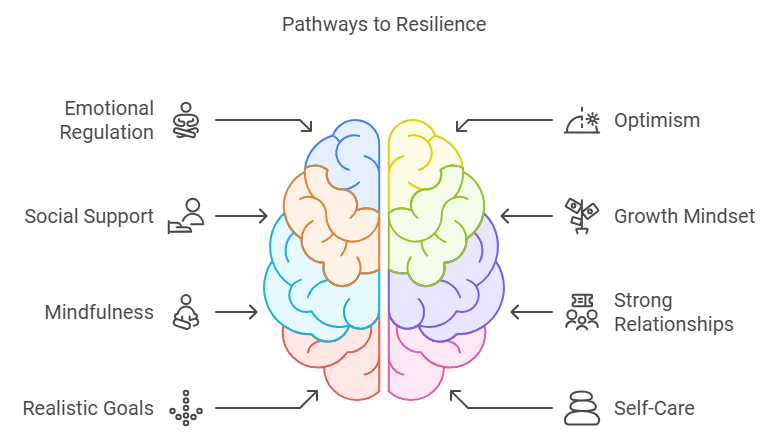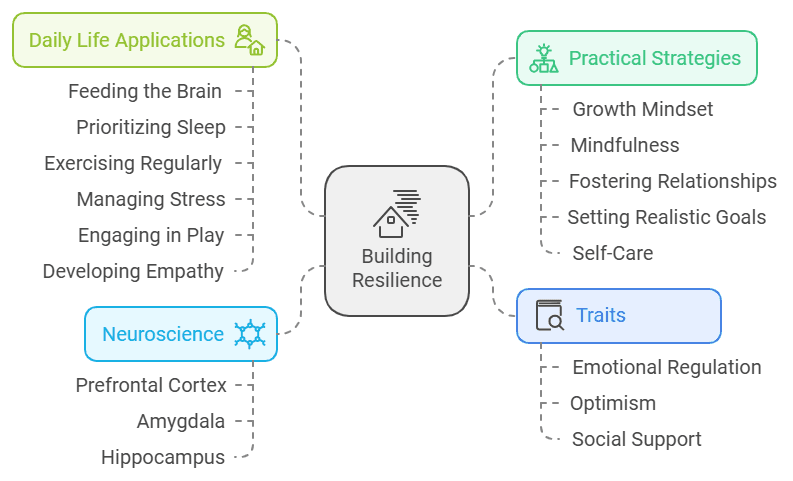Building Resilience: The Key to Thriving Through Change
By VisionAriser Team
In a world that is constantly evolving, the ability to adapt and thrive amidst change is more important than ever. Whether you're facing personal challenges, professional transitions, or unexpected life events, resilience is the cornerstone of successful navigation through these tumultuous times.
At VisionAriser, we believe that resilience can be cultivated, and we’re here to guide you on this journey.
Understanding Resilience: A Scientific Perspective

Resilience is not just a buzzword; it's a scientifically recognized trait that can be developed over time. Research indicates that resilient individuals possess specific characteristics that enable them to bounce back from adversity. According to a study published in the Journal of Personality and Social Psychology, resilience involves:
Emotional Regulation: The ability to manage emotions effectively during stress.
Optimism: A positive outlook that fosters hope and motivation.
Social Support: Building and maintaining strong relationships that provide encouragement.
The Neuroscience of Resilience
Neuroscience offers valuable insights into how our brains respond to stress and adversity. The prefrontal cortex, responsible for decision-making and emotional regulation, plays a crucial role in resilience.
Recent findings show that resilient brains exhibit higher activity levels in the left prefrontal cortex, which is linked to emotional responses and mood regulation.
Moreover, studies indicate that about 70% of individuals exposed to significant stressors demonstrate resilience, meaning they do not develop stress-related disorders. This statistic highlights the remarkable capacity of the human brain to adapt positively even in challenging circumstances.
Key Brain Functions Related to Resilience:
Amygdala Activation: This part of the brain processes emotions, especially fear. A highly reactive amygdala can lead to anxiety and stress responses.
Hippocampus Functionality: Responsible for memory and learning, a healthy hippocampus helps us contextualise past experiences and learn from them.
Neuroplasticity: Our brains can rewire themselves based on experiences. Engaging in positive behaviours can strengthen neural pathways associated with resilience.
Practical Strategies to Build Resilience

At VisionAriser, we advocate for actionable strategies that can help you cultivate resilience:
1. Develop a Growth Mindset
Embrace challenges as opportunities for growth rather than obstacles.
Research by psychologist Carol Dweck shows that individuals with a growth mindset are more likely to persevere through difficulties.
- Action Step: Reflect on past challenges and identify the lessons learned from those experiences.
2. Practice Mindfulness
Mindfulness practices such as meditation and deep breathing can enhance emotional regulation and reduce stress levels.
Studies indicate that mindfulness can physically alter brain structures associated with stress response, leading to improved resilience.
- Action Step: Dedicate 10 minutes daily to mindfulness meditation or deep breathing exercises.
3. Foster Strong Relationships
Building a support network is crucial for resilience.
Social connections provide emotional support and practical assistance during tough times.
- Action Step: Reach out to friends or family members regularly, fostering deeper connections through meaningful conversations.
4. Set Realistic Goals
Break down larger goals into manageable steps.
This approach not only makes tasks feel less overwhelming but also allows you to celebrate small victories along the way.
- Action Step: Create a list of short-term goals related to your long-term aspirations, focusing on one step at a time.
5. Embrace Self-Care
Physical well-being significantly impacts mental resilience.
Regular exercise, balanced nutrition, and adequate sleep are foundational elements for maintaining emotional health.
- Action Step: Establish a self-care routine that includes physical activity, healthy meals, and sufficient rest.
Apply Neuroscience Principles in Daily life
In addition to these strategies, you can further enhance your resilience by applying neuroscience principles in your daily routine:
Feed Your Brain: Consume foods rich in omega-3 fatty acids (like walnuts) and antioxidants (like blueberries) to support brain health.
Prioritise Sleep: Aim for 7-9 hours of quality sleep each night to help your brain consolidate memories and recover from daily stressors.
Exercise Regularly: Engage in physical activity to increase blood flow to the brain, promoting neuroplasticity.
Practice Strategic Naps: A short 20-minute nap can enhance cognitive performance and refresh your mind.
Manage Stress: Incorporate stress-reduction techniques such as deep breathing or progressive muscle relaxation into your routine.
Engage in Play: Playful activities stimulate creativity and flexible thinking, essential components of resilience.
Develop Empathy: Actively try to understand others' perspectives to strengthen neural pathways associated with emotional intelligence.
The VisionAriser Commitment
At VisionAriser, we are dedicated to helping you build resilience through evidence-based techniques grounded in neuroscience and Cognitive Behavioural Therapy(CBT) to empower you on your journey of transformation.
Remember, resilience is not just about bouncing back; it’s about bouncing forward into a brighter future filled with possibilities!
Are you ready to cultivate resilience and thrive in the face of change?






